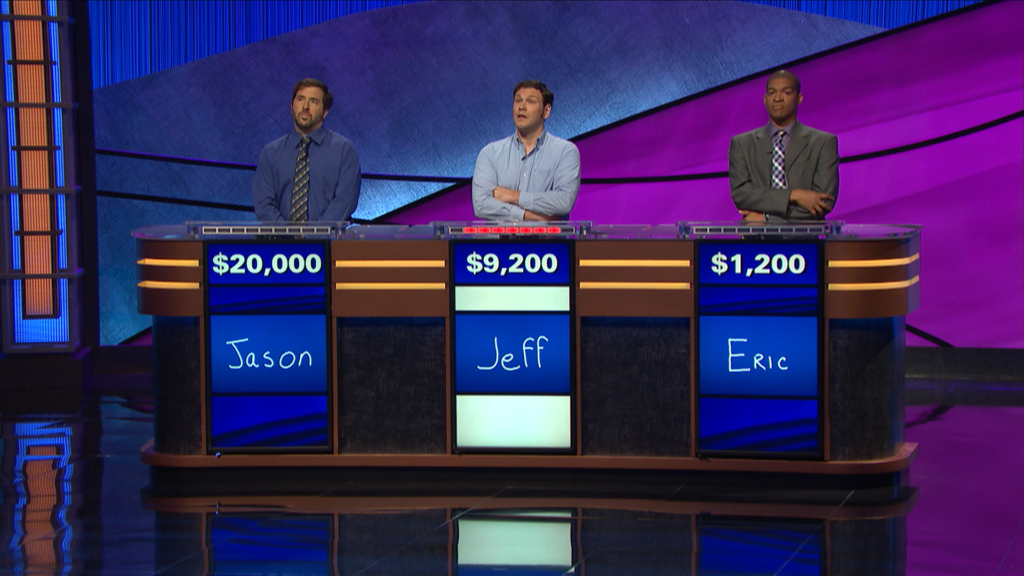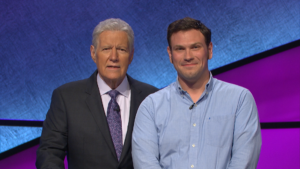If you have questions, Jeff Harbin can help you find the answers. That’s one of his favorite things about being a librarian. But if you have answers, he can help you find the corresponding questions, too.
About two weeks ago, Harbin appeared on “Jeopardy,” the popular game show where host Alex Trebek reads answers and contestants respond in the form of a question. It’s a test of wide-ranging knowledge, quick thinking, and the ability to buzz in before your opponents.

Harbin came in second to Jason Zuffranieri, who was halfway through a 19-day winning streak. But just being on the show was a dream come true for someone who treasures facts and figures. “I’ve always been a trivia nerd,” Harbin said. “I used to watch ‘Jeopardy’ when I was really little with my grandfather, because he always loved it.”
“Jeopardy” screens its would-be contestants with an online test, which Harbin has taken several times over the past 10 years. This spring, he was finally called for an in-person audition in Boston. (At the time, he was working in New Hampshire.) When that went well, he was invited to Los Angeles to appear on the show.
Harbin’s episode was filmed in late July. It happened to be Trebek’s birthday. “They rolled his cake out for him. It said, ‘Who is 79?’” Harbin said.

The hardest part of being on the show is buzzing in at the right time, Harbin said. Click your button before the clue is finished, and you’re locked out. But if someone else beats you by a split second, you’ve lost your chance to answer.
Harbin said he knew the answer to every question in the “Country Music” category but never beat Zuffranieri to the buzzer. “He was just brutally fast.”
The show moved rapidly, too. “It’s the quickest 22 minutes I’ve ever experienced,” Harbin said. “It feels like it all happens in a blink. You get up there, the lights are on you. You have to think fast.”
It moved so quickly that Harbin didn’t even notice when he carried the entire “Cistern Cities” category by answering all of its clues.
When he got a “Daily Double” clue, which allowed him to name the value, he wagered his entire winnings, making it a “true Daily Double.” As soon as he heard the clue about Aristotle naming the bones of the fingers, he knew the answer. “What are phalanges?” he said.
“That was a wonderful, wonderful feeling.”
Harbin’s episode aired September 12. Eleven days later, he started his new job at the University of Lynchburg.
As the access services librarian, he runs what he calls “the frontline services of the library,” such as circulation, book reservations, and inter-library loan. He also helps faculty and students find the resources they need for research projects.
Harbin has an interesting connection to the University of Lynchburg’s history. He earned his English degree and later worked in the library at Milligan College, another college that, like Lynchburg, was founded by Josephus Hopwood.
Before coming to Lynchburg, Harbin worked for a much larger university library, but he found it didn’t allow him to provide the personalized service that means a lot to him. “It was the small college environment that sort of drew me back,” he said.
“I really appreciated what Lynchburg had to offer. The staff, I really liked getting to know them. The administrators that I met, they had a clear vision of what the University was doing and how they saw the librarian’s role.”
A library, Harbin said, is an important part of university life. “It’s very much a living, growing, thriving organism that has to adapt to the times but also stay true to its mission of facilitating information access. … We serve many purposes here. We’re versatile. We continue to change with the times.”

